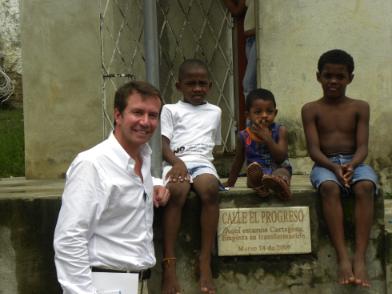
Brison in Colombia's Nelson Mandela neighbourhood, near Cartagena.
Gay Liberal MP Scott Brison first became interested in Colombia when he met Luis Plata, a fellow winner of the Young Global Leader award, at the 2005 World Economic Forum.
Plata, who Brison got to know better at regular forum meetings in Dalian, China, and Davos, Switzerland, went on to become Colombia’s minister of commerce, industry and tourism.
When parliamentary opposition to a free trade agreement proposal between Canada and Colombia threatened to quash the deal in 2009, Brison says he argued for engagement with Colombia.
Many MPs were worried about the South American country’s poor track record on human rights.
“I explained to my leader, Michael Ignatieff . . . that I felt if we’re serious about human rights in places like Colombia, sometimes constructive engagement, the right kind of constructive economic engagement, can actually strengthen human rights,” says Brison, who was his party’s trade critic at the time.
“I also expressed that I believed the [Álvaro] Uribe government had made a lot of progress on security, the economy, and rights and governance,” Brison says, noting that Ignatieff then encouraged him to find a way to address the concerns of other Liberals.
Brison and Plata teamed up with Colombia’s foreign affairs minister, Jaime Bermúdez, and organized a series of meetings between Uribe and Ignatieff.
In August of 2009, Brison and then foreign affairs critic Bob Rae travelled to Colombia and met with Uribe, Plata, Bermúdez, Christian Salazar – the UN commissioner on human rights in Colombia – as well as labour and human rights leaders.
“It was very clear to me that yes, there continued to be some security challenges and violence issues in Colombia, [but] there had been a lot of progress,” Brison says, noting that crime levels in Colombian cities are lower than in several cities in the United States.
“Colombia had been a country that for 40 years [was] torn apart by a civil war that began as an ideological war but became a drug war,” he says. “So if you’re serious about helping people move on to a more peaceful future, you have to give them options that are different from the drug war.”
Brison says he, Plata and Rae decided to create a human rights treaty that would require greater transparency around reporting the impact of the free trade agreement on human rights in Colombia.
Brison tried to move the treaty forward in Canada, but despite Uribe’s agreement, Conservative ministers initially rebuffed the idea.
“Bottom line, we got this done,” Brison says of the treaty. “The Harper government twice tried to dilute it, taking it from being a binding agreement – a treaty in effect – and tried to make a memorandum of understanding.”
The treaty was signed and the free trade agreement passed Parliament at the end of June 2010, and Brison returned to Colombia in August 2010 for the inauguration of President Juan Manuel Santos.
Brison says one of the most meaningful parts of his trip back to Colombia was being able to visit communities that are home to former combatants as well as victims of Colombia’s wars.
“They’re living together there, in some cases former combatants with missing limbs; in other cases, mothers who’ve lost sons and grandsons.”
He recounts a meeting with an elderly woman who had been a victim of the conflict and lost sons to the fighting.
“She said, ‘At first I hated the former paramilitaries, but now I see who killed my son; but today I see that they were victims as much as we were,’” Brison says.
“There had been significant reconciliation in that community where they’re working together to build roads, and invest in schools and education,” he notes.
Brison thinks one of Colombia’s biggest challenges is affordable higher education and incentives for young people to finish high school.
“One of the things I’d like to be able to do is try to get some more Canadian companies who are investing in Colombia, and Canadian investors – particularly in the extractive sectors – to help . . . by making those kinds of investments,” Brison says. “It’s actually in the interest of investors to have a peaceful Colombia and a stable Colombia.”
Brison says there are several Canadian companies active in Colombia that could pursue such initiatives.
“It’s the right thing to do,” he says. “But it’s also in the companies’ vested interest.”


 Why you can trust Xtra
Why you can trust Xtra


